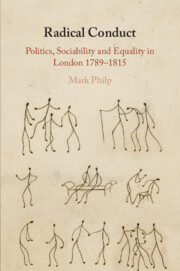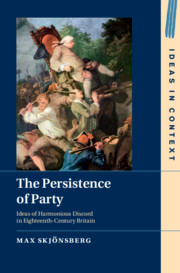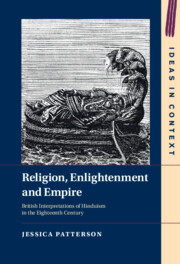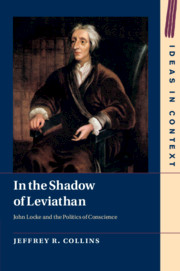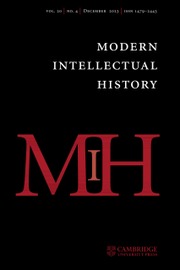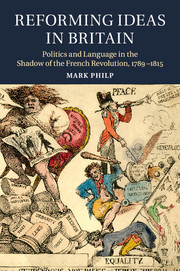Radical Conduct
Politics, Sociability and Equality in London 1789-1815
- Author: Mark Philp, University of Warwick
- Date Published: December 2022
- availability: Available
- format: Paperback
- isbn: 9781108820219
Paperback
Other available formats:
Hardback, eBook
Looking for an examination copy?
This title is not currently available for examination. However, if you are interested in the title for your course we can consider offering an examination copy. To register your interest please contact [email protected] providing details of the course you are teaching.
-
While the French Revolution drew immense attention to French radicals and their ideas, London also played host to a radical intellectual culture. Drawing on both original material and a range of interdisciplinary insights, Radical Conduct transforms our understanding of the literary radicalism of London at the time of the French Revolution. It offers new accounts of people's understanding of and relationship to politics, their sense of the boundaries of privacy, their practices of sociability, friendship, gossip and discussion, the relations between radical men and women, and their location in a wider world of sound and movement in the period. It reveals a series of tensions between many radicals' deliberative practices and aspirations and the conventions and practices in which their behaviour remained embedded. Exploring these relationships and pressures reveals the fractured world of London society and politics, dramatically illuminating both the changing fortunes of radical men and women, and the intriguing uncertainties that drove some of the government's repressive policies.
Read more- Presents the period in a new way that sheds new light on major figures of English radicalism and feminism, questioning common assumptions about the literary and political world of the 1790s
- Knits together social and cultural history with intellectual history through a fresh interpretation of literary sources
- Illuminates the tensions between the world that the radicals imagined and sought to bring into being, and the social conventions and norms of their time that undercut their ambitions
Reviews & endorsements
‘Radical Conduct is a remarkable redefinition of sociability as political practice. For Godwin, Wollstonecraft and their friends, the personal was always political, and their politics had to be tested against their conduct, as they attempted to challenge habit and custom though everyday interactions recorded in their diaries, letters, and fiction.’ Jon Mee, University of York
See more reviews‘Mark Philp’s important study advances debates on late-eighteenth-century social, political and literary culture in crucial ways, reconceptualizing the ways that people thought about and practised both politics and sociability in the period. Its focus on lived experience and conduct demonstrates the ways in which political aspirations often clashed with practice.’ Mary Fairclough, University of York
‘Philp’s overall achievement is a rich, nuanced, and often poignant picture of how metropolitan radicalism was practiced in the age of revolutions.’ Gordon Pentland, Journal of British Studies
‘Philp’s … portrait of 1790s literary radicalism immeasurably enriches our understanding of the world that shaped democratic combat during a transformative moment in British politics.’ Barbara Taylor, History Workshop Journal
'This volume augments this outstanding contribution by focusing on the London “middling orders” who made up Godwin’s literary circle and others like it, men like Thomas Holcroft, and a great many women, including Mary Hays, Elizabeth Inchbald, Amelia Alderson, and Mary Wollstonecraft, who amongst others are given special attention here.' Gregory Claeys, International Review of Social History
‘… a careful, nuanced study of how London’s radical reformist circles pursued 'deliberative equality' within a context of significant social inequality … Emerging from pandemic social and intellectual isolation, this book takes on a resonance that makes it a particularly profound read.' Miriam L. Wallace, Eighteenth-Century Fiction
'… a superb contribution to studies of popular and literary radicalism during the French and Napoleonic wars. It offers a deeper understanding of notions of sociability, friendship, and gender in this period.' Katrina Navickas, The American Historical Review
‘… a strikingly original work which should be read by historians and literary scholars of the period 1789–1815.' James Epstein, Studies in Romanticism
Customer reviews
Not yet reviewed
Be the first to review
Review was not posted due to profanity
×Product details
- Date Published: December 2022
- format: Paperback
- isbn: 9781108820219
- length: 285 pages
- dimensions: 228 x 152 x 15 mm
- weight: 0.43kg
- availability: Available
Table of Contents
Introduction
1. Politics and privacy
2. Disagreement and deliberation
3. Plurality: women's circles in London
4. Radical literary women
5. Gender and deliberative equality
6. Negotiating equality
7. A private affair
8. Music and movement
Conclusion. Life during wartime.
Sorry, this resource is locked
Please register or sign in to request access. If you are having problems accessing these resources please email [email protected]
Register Sign in» Proceed
You are now leaving the Cambridge University Press website. Your eBook purchase and download will be completed by our partner www.ebooks.com. Please see the permission section of the www.ebooks.com catalogue page for details of the print & copy limits on our eBooks.
Continue ×Are you sure you want to delete your account?
This cannot be undone.
Thank you for your feedback which will help us improve our service.
If you requested a response, we will make sure to get back to you shortly.
×
